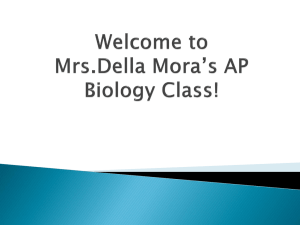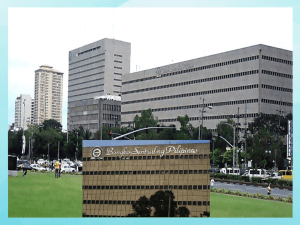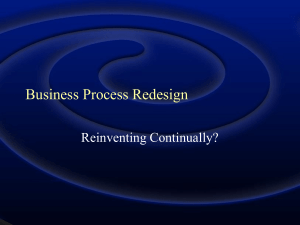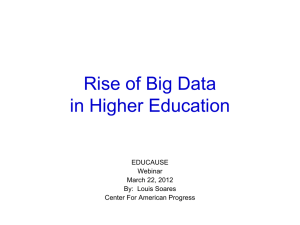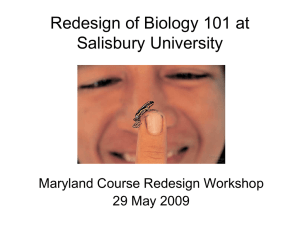A Central Challenge Preliminary Recommendations from the
advertisement
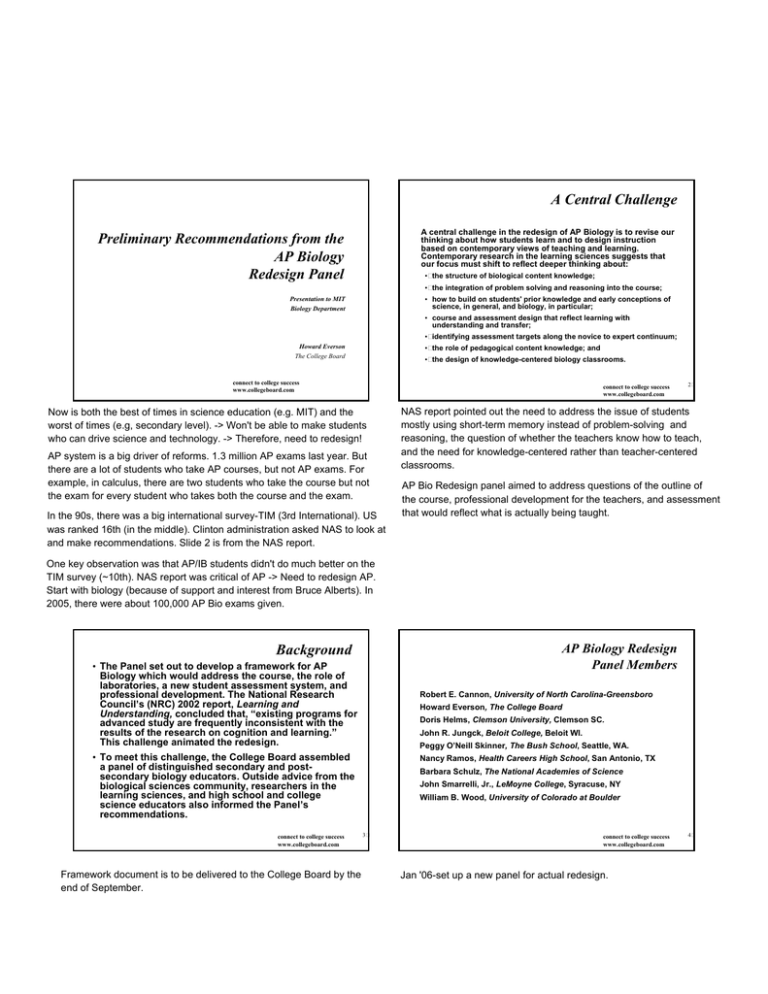
A Central Challenge A central challenge in the redesign of AP Biology is to revise our thinking about how students learn and to design instruction based on contemporary views of teaching and learning. Contemporary research in the learning sciences suggests that our focus must shift to reflect deeper thinking about: Preliminary Recommendations from the AP Biology Redesign Panel • the structure of biological content knowledge; • the integration of problem solving and reasoning into the course; • how to build on students' prior knowledge and early conceptions of science, in general, and biology, in particular; Presentation to MIT Biology Department • course and assessment design that reflect learning with understanding and transfer; • identifying assessment targets along the novice to expert continuum; Howard Everson The College Board • the role of pedagogical content knowledge; and • the design of knowledge-centered biology classrooms. connect to college success www.collegeboard.com connect to college success www.collegeboard.com Now is both the best of times in science education (e.g. MIT) and the worst of times (e.g, secondary level). -> Won't be able to make students who can drive science and technology. -> Therefore, need to redesign! AP system is a big driver of reforms. 1.3 million AP exams last year. But there are a lot of students who take AP courses, but not AP exams. For example, in calculus, there are two students who take the course but not the exam for every student who takes both the course and the exam. In the 90s, there was a big international survey-TIM (3rd International). US was ranked 16th (in the middle). Clinton administration asked NAS to look at and make recommendations. Slide 2 is from the NAS report. 2 NAS report pointed out the need to address the issue of students mostly using short-term memory instead of problem-solving and reasoning, the question of whether the teachers know how to teach, and the need for knowledge-centered rather than teacher-centered classrooms. AP Bio Redesign panel aimed to address questions of the outline of the course, professional development for the teachers, and assessment that would reflect what is actually being taught. One key observation was that AP/IB students didn't do much better on the TIM survey (~10th). NAS report was critical of AP -> Need to redesign AP. Start with biology (because of support and interest from Bruce Alberts). In 2005, there were about 100,000 AP Bio exams given. AP Biology Redesign Panel Members Background • The Panel set out to develop a framework for AP Biology which would address the course, the role of laboratories, a new student assessment system, and professional development. The National Research Council’s (NRC) 2002 report, Learning and Understanding, concluded that, “existing programs for advanced study are frequently inconsistent with the results of the research on cognition and learning.” This challenge animated the redesign. Robert E. Cannon, University of North Carolina-Greensboro Howard Everson, The College Board Doris Helms, Clemson University, Clemson SC. John R. Jungck, Beloit College, Beloit WI. Peggy O’Neill Skinner, The Bush School, Seattle, WA. • To meet this challenge, the College Board assembled a panel of distinguished secondary and postsecondary biology educators. Outside advice from the biological sciences community, researchers in the learning sciences, and high school and college science educators also informed the Panel’s recommendations. connect to college success www.collegeboard.com Framework document is to be delivered to the College Board by the end of September. Nancy Ramos, Health Careers High School, San Antonio, TX Barbara Schulz, The National Academies of Science John Smarrelli, Jr., LeMoyne College, Syracuse, NY William B. Wood, University of Colorado at Boulder 3 connect to college success www.collegeboard.com Jan '06-set up a new panel for actual redesign. 4 Redesign Considerations AP Redesign Conceptual Framework • Learning with Understanding Learning With Understanding • Equity, Access, and Excellence • Quantity vs Quality Learner Centered Knowledge Centered • The Role of Technology Assessment Centered connect to college success www.collegeboard.com 5 connect to college success www.collegeboard.com Redesign considerations. 6 Can students read 3 chapters of Campbell every night? No, especially if ESL. -> Textbook is not learner-centered. Equity: we don't want a program for elite only. Quantity vs. quality: Campbell is the official textbook. But it's huge. Contains too much information. What to do? For the AP Redesign framework, think about the learner: what do they bring to the classroom. The role of technology: Labs. Can good labs be delivered in an average HS with not much access to technology? We need sound assessment-need hypothesis, way to test it, evidence. For example, College Board recently funded 7 schools in the Bronx for AP labs in chemistry and calculus. The price was $65,000. AP Biology Conceptual Framework Redesign Panel’s Recommendations • Stress the Role of Students’ Prior Knowledge • A Course Design Guided by a Conceptual Framework and Thematic Approach to Teaching Biology • An Emphasis on Depth of Understanding vs Breadth of Content • Less Is More: Limit Content Coverage • Inquiry-Based Learning via Labs & Fieldwork • Emphasize Interdisciplinary Connections to Mathematics and Other Sciences • Incorporate Formative and Summative Assessment • Increased Need for Professional Development connect to college success www.collegeboard.com 7 Proposed AP Biology Conceptual Framework. Expect debate about the central role of evolution in the framework. Science as a process theme is important for learning with understanding. connect to college success www.collegeboard.com 8 Recommendations. Prior knowledge: What do you assume when students walk in the door (e.g. reading level? Statistics?)? How do we know that they know it? Interdisciplinary connections: Teachers need to emphasize these connections because students do not make them themselves. Experts have tacit knowledge & understanding. Need to make this explicit. Formative assessment: do this regularly, at regular intervals. Question: how to infer information from formative assessment? Professional development: Need to invest large sums of money. The goal should be to make all teachers highly proficient, rather than to give AP classes to the most proficient teachers. Proposed Next Steps • Draft Report of AP Redesign Panel (July ’05) • Survey AP Biology Teaching Community for Reactions, Comments, Suggestions • Review and Vet Report through the National Academy of Sciences • Move to Design Phase II • Initiate Field Testing of new design: 2006-2007 • Complete AP Biology Redesign by AY 2008 connect to college success www.collegeboard.com 9 9% of students in US are in AP-most selective educational program in the US. Elitism is a folklore notion of intelligence. In the US 11% of students are classified as gifted and talented. In Europe, it's 27%. Q: What are the good incentives for teachers/faculty to take advantage of professional development? HE: Question the College Board is struggling with. Q: How does instruction in the countries that do well/better than US compare to here? Is student time on task a possible answer? HE: For calculus, found that a big factor is teacher qualification. Probably because experts can make material accessible.

